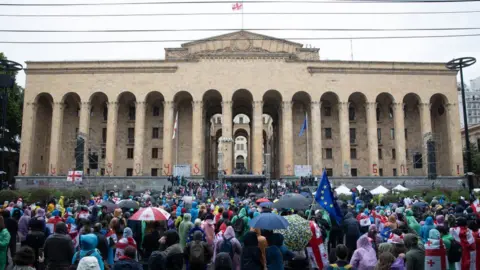Georgia approves controversial 'foreign agent' law, sparking more protests
Georgia's parliament has voted through a divisive "foreign agent" law that has sparked weeks of mass street protests.
However, the bill now faces a likely veto by Georgia's president, which the parliament in Tbilisi can override by holding an additional vote.
Critics say the bill - which they call the "Russia law" - could be used to threaten civil liberties.
After the vote, protesters tried to enter the parliament while crowds also shut down a major intersection
Under the bill - which passed its third and final reading with 84 votes against 30 on Tuesday - NGOs and independent media that receive more than 20% of their funding from foreign donors would have to register as organisations "bearing the interests of a foreign power".
They would also be monitored by the Justice Ministry and could be forced to share sensitive information - or face hefty fines of up to 25,000 GEL ($9,400; £7,500).
Protesters are concerned that the legislation would be used by the government to suppress its opponents. Parallels have also been drawn with an authoritarian bill which came into force in Russia in 2012, and which the Kremlin has since used to clamp down on dissidents.
On Monday, Prime Minister Irakli Kobakhidze warned that if authorities backed down at the bill's third reading, Georgia would lose sovereignty and "easily share the fate of Ukraine", without detailing what he meant.
Protesters heckled the police - clad in full riot gear - guarding the side entrances to the building. Arrests were made after some tried to break through the iron barriers near the building. The atmosphere was tense inside the parliament too, with physical and verbal altercations taking place between pro-government and opposition MPs.
As she walked into the parliament building, President Salome Zourabichvili - an opponent of Mr Kobakhidze - told the BBC she would veto the law.
However, Georgian Dream has sufficient numbers in parliament to overrule her, and there are few doubts the legislation will pass.
 Getty Images
Getty ImagesOpposition parties say the new law could harm Georgia's attempt to join the European Union (EU), which has given it candidate status. The EU has warned the bill could jeopardise further progress within the bloc.
In a post on X, president of the European Parliament Roberta Metsola wrote: "Tbilisi, we hear you! We see you!", adding that Georgians protesting "want a European future".
The White House warned it would "reassess" its ties with Georgia following the development, with press secretary Karine Jean-Pierre calling on Georgia's president to veto the law.
The UK's Minister for Europe, Nusrat Ghani, said the scenes in Georgia "are shocking".
Natia Seskuria, who previously worked for Georgia's National Security Council, told the BBC she believed the protests against the law would continue.
The people of Georgia will "rally against this law as long as it takes", she said, adding that the new law represented an "existential threat" to the country's survival.
The bill comes just five months before a parliamentary election in the country, which some protestors say offers a chance to vote out Georgian Dream which has held power since 2012.
"We are waiting for when we will have a choice to choose a new government", a 27-year old protestor told AFP but declined to give his last name over fears for his safety.
Massive rallies against the bill have gripped the Caucasus country for nearly a month. Photos and footage posted online in recent days appeared to show violent altercations between protesters and police.
